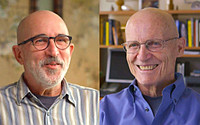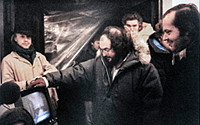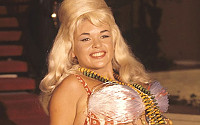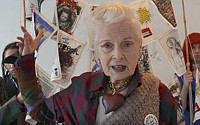| SHADOWS ON THE WALL | REVIEWS | NEWS | FESTIVAL | AWARDS | Q&A | ABOUT | TALKBACK | ||
 Shadows off the beaten path Shadows off the beaten path | ||
| Indies, foreigns, docs, revivals and shorts... | ||
|
On this page:
CONVERSATIONS WITH GAY ELDERS |
FILMWORKER MANSFIELD 66/67 | THE OUTSIDER | WESTWOOD: PUNK, ICON, ACTIVIST < < D O C S > > last update 13.May.18 See also: SHADOWS FILM FESTIVAL | ||
 R E V I E W B Y R I C H C L I N E
R E V I E W B Y R I C H C L I N E | ||
Conversations With Gay Elders: Kerby Lauderdale

| ||
|
dir-prd David Weissman with Kerby Lauderdale, David Weissman, Linda Lauderdale, Thomas Lauderdale, Aaron, Jeff, Ken release UK Mar.18 flare 17/US 1h09  release UK 8.Jun.18,
release UK 8.Jun.18, US 20.Jul.18 18/UK 1h51 
|  Part of an ongoing series, this doc is simply a conversation between two men. And it's utterly riveting. It features filmmaker David Weissman (We Were Here) encouraging Kerby Lauderdale to recount his relatively normal story. But this is an honest, revelatory look at the thoughts and feelings of a man who grappled with his sexuality throughout his life. And what he has to say is vitally important in the wider conversation about the topic.
Part of an ongoing series, this doc is simply a conversation between two men. And it's utterly riveting. It features filmmaker David Weissman (We Were Here) encouraging Kerby Lauderdale to recount his relatively normal story. But this is an honest, revelatory look at the thoughts and feelings of a man who grappled with his sexuality throughout his life. And what he has to say is vitally important in the wider conversation about the topic.
Born in 1938 Los Angeles, Kerby grew up with a single dad who didn't understand him. Never the athlete that his older brother was, he had an otherwise normal childhood and was never taught about sex or sexuality. But he knew from an early age that his attraction was outside the "assumed morality". He was surprised when he found himself attracted to a woman, married her and adopted four children. It wasn't until he reached his 40s that he felt able to be honest: in a relationship with a man who would later die as a result of Aids. This is a friendly, refreshingly honest conversation between two men, peppered with lively anecdotes and personal recollections. Lauderdale says he knew he could never act on his deeper desires, so he compartmentalised this part of himself. Obviously, relationships with women were strained, and interaction with men was taboo. Meanwhile, he left forestry to pastor a church, then returned to gardening. He also realised that he and his wife had to confront his true nature. And after finally accepting his sexuality, he was able to return to the pastorate. Along the way, there are snapshots from Lauderdale's life, including fascinating clips from TV chat shows with his then-wife Linda, discussing how they kept their marriage going. Lauderdale's stories trace the history of gay rights in America from complete repression in the 1950s to sexual liberation in the '60s and the opening of politics and culture in the '70s. His story is notable as it reflects a large number of men who lived a straight life for so many years, even though they knew it was wrong. Topics go much deeper than Lauderdale's specific experience, as Weissman explores how mainstream culture continually tries to explain why someone might be gay, when it's just as complex and deep as being straight. And even though he tried to change, he understood that his sexuality was fixed and normal, part of his core identity. Indeed, Lauderdale is an observant man who puts his experiences in resonant context as he embraces "the flawed nature of perfection". | |
|
15 themes, language 24.Mar.18 | ||
 R E V I E W B Y R I C H C L I N E
R E V I E W B Y R I C H C L I N E | ||
Filmworker
 MUST MUST  SEE SEE
| ||
|
dir Tony Zierra prd Elizabeth Yoffe, Tony Zierra with Leon Vitali, Ryan O'Neal, Danny Lloyd, Matthew Modine, R Lee Ermey, Max Vitali, Stellan Skarsgard, Pernilla August, Marie Richardson, Tim Colceri, Brian Capron, Steve Southgate  release US 11.May.18, UK 18.May.18 17/US 1h34 
|  A fascinating look at Stanley Kubrick's work, this skilfully assembled documentary is a treasure trove for movie fans. Leon Vitali listed "filmworker" as his occupation because he had a hand in virtually every aspect of Kubrick's last three projects. So not only is this a rare glimpse into these films, but it's also an involving portrait of a man who gave himself to something he loved.
A fascinating look at Stanley Kubrick's work, this skilfully assembled documentary is a treasure trove for movie fans. Leon Vitali listed "filmworker" as his occupation because he had a hand in virtually every aspect of Kubrick's last three projects. So not only is this a rare glimpse into these films, but it's also an involving portrait of a man who gave himself to something he loved.
A busy young British actor in the 1960s, Vitali likens himself to a moth attracted to Kubrick's flame, mesmerised by 2001 and A Clockwork Orange: "I want to work for that man!" So he auditioned and got a role in Barry Lyndon. This sparked his interest in filmmaking itself, so he went to work for Kubrick, casting and working with Danny Lloyd on The Shining then running dialog with other actors and taking detailed notes on sets. And after Kubrick's death, Vitali became the only person who would stand up for the director's vision as his films were restored. Telling the story chronologically with a sharply edited collection of clips, stills and sketches, Vitali's narrative continually reveals details about the process of filmmaking, and specifically Kubrick's distinctively exhaustive and meticulous approach. Modine describes Vitali as Igor to Kubrick's Dr Frankenstein, willing to do whatever the master asked him to do. Over 30 years, Vitali developed an expertise in virtually every aspect of film production, including marketing and archiving. In addition to Barry Lyndon and The Shining, the doc features eye-opening sequences delving into the making of Full Metal Jacket and Eyes Wide Shut. Vitali was the keeper of Kubrick's notoriously mercurial quality control, working with everyone throughout the process. He had the ability to speak the truth to Kubrick without igniting his hot temper, so Vitali's patience and loyalty became legendary. There's also an intriguing segment going into Vitali's background, which helps explain his unusual connection with Kubrick. This is an eye-opening depiction of a partnership between two men with an unusual capacity to work together over an extended period. This extended to all aspects of the director's life, including managing his dogs and cats. As Vitali says, a lot of people would have given their right arm to work with Kubrick, but none were willing to give everything. And since Kubrick was giving his all, Vitali was happy to give these decades to the work. This is a beautiful profile of someone who makes movies for the sheer love of it. And he shouldn't remain anonymous. | |
|
15 themes, language 8.May.18
| | |
 R E V I E W B Y R I C H C L I N E
R E V I E W B Y R I C H C L I N E | ||
Mansfield 66/67
| ||
|
dir P David Ebersole, Todd Hughes prd Larra Anderson, P David Ebersole, Todd Hughes with John Waters, Kenneth Anger, Mamie Van Doren, Tippi Hedren, Marilyn, AJ Benza, Cheryl Dunye, Mary Woronov, Sue Bernard, Matt Momchilov, Yolonda Ross, Ann Magnuson, Richmond Arquette  release US 27.Oct.17,
release US 27.Oct.17, UK 13.Apr.18 17/US 1h24 
|  Taking a lurid approach, this documentary plays out like a groovy trash-fest as it explores the gossip surrounding screen bombshell Jayne Mansfield in the final year of her life, as well as after her death. Deploying dance performance, animation and a witty juxtaposition of clips, the filmmakers play up the more salacious elements of Mansfield's life. It's entertaining and fascinating, and also somewhat abrasive.
Taking a lurid approach, this documentary plays out like a groovy trash-fest as it explores the gossip surrounding screen bombshell Jayne Mansfield in the final year of her life, as well as after her death. Deploying dance performance, animation and a witty juxtaposition of clips, the filmmakers play up the more salacious elements of Mansfield's life. It's entertaining and fascinating, and also somewhat abrasive.
Almost a pastiche of Marilyn Monroe, Mansfield had a curvier body and squeakier voice. And she used it to become famous, starring in camp classics while living her life in gossip magazines like a prototype reality TV star. From marriages and messy divorces to career problems, everything was public knowledge, including her friendship with notorious satanist Anton LaVey. Rumour had it that he put a curse on her lawyer boyfriend Sam Brody, saying he would die in a car crash. Indeed, he had seven nasty accidents, and the final one took his life as well as Mansfield's. The tabloid approach gives this documentary a deranged sensibility that's enjoyably entertaining. But this also leaves it feeling superficial, which perhaps isn't true due to insightful comments by interviewees who have firsthand knowledge of the events. The main point is that we will never know the truth about Mansfield's relationship with LaVey or the circumstances surrounding her death, but at least the filmmakers debunk quite a lot of the hearsay. Mansfield was certainly a colourful figure in Hollywood history, a trailblazer who ruffled feathers with her unapologetic sexuality and unwillingness to play the usual publicity games. Watching this doc it feels like she lived a long, event-filled life, even though she died at only 34. But in those years, she packed in several marriages, five children, successes in theatre, film, music and television. She was the Playboy centrefold who created the hourglass figure, and she performed the first nude scene by a mainstream Hollywood actress (in 1963's Promises! Promises!) Even with its messy structure and sometimes random flourishes, the film covers all of this and more with an archness that echoes Mansfield's own self-deprecating sense of humour. Clearly, she was far more intelligent than anyone ever gave her credit for, but she was also, like so many of her contemporaries, addicted to fame and adulation, which led to alcoholism and drug abuse as her career waned. But it was her mastery of the fame game that is perhaps her most lasting legacy. | |
|
15 themes, language, nudity 7.Mar.18 | ||
 R E V I E W B Y R I C H C L I N E
R E V I E W B Y R I C H C L I N E | ||
The Outsider

| ||
|
dir-scr-prd Tom Meadmore with Nobu Su, Eli, Ailee, Seth Freedman, Sam Chambers, Michel Guy, Michelle Blockmann, David Osler, Alan Hooper, Mark Rifkin, Yuso Tobiyaka, Sabruto Banerji, Michelle Solomon  release UK 20.Apr.18 18/UK 1h37 
|  Putting the spotlight on a major issue that's little-reported, this documentary explores the extraordinary rise and fall of shipping mogul Nobu Su, who refused to play by old-world rules as he built an enormous empire then watched it crumble. Filmmaker Tom Meadmore goes too deep into the banking details, and he also struggles to find the core thrust of the story. But Nobu is an amazing character.
Putting the spotlight on a major issue that's little-reported, this documentary explores the extraordinary rise and fall of shipping mogul Nobu Su, who refused to play by old-world rules as he built an enormous empire then watched it crumble. Filmmaker Tom Meadmore goes too deep into the banking details, and he also struggles to find the core thrust of the story. But Nobu is an amazing character.
As the son of a Taiwanese shipping magnate, Nobu grew up in the business and quickly realised ways to expand his father's empire into a global monolith. The old-world shipping establishment, mainly the Greeks and Brits, aren't too happy about this, never letting him into the inner circle. So he does his own thing and makes billions, creating his distinct fleet of super-tankers. Then the 2008 financial collapse slashes his ability to cover his expenses. And he also watches in horror as the world's largest banks (Britain's RBS and Taiwan's Megabank) work out ways to deprive him of his fortune. Meadmore follows Nobu through this story as he rails against everyone who has conspired against him while maintaining his smiley optimism. But the strain cost him his family as well as his bank balance, and it's in scenes with his daughters Eli and Ailee that the film hints at a deeper, more involving storyline. Instead, Meadmore opts to follow the money trail, talking mainly to financial journalists who disagree about what has happened, largely depending on their loyalty to the establishment. The film has a lively pace, interspersing to-camera interviews along with Nobu's own running commentary and a number of fly-on-the-wall sequences. Scenes shot on the decks of Nobu's ships offer visual expansiveness in contrast to the dull corporate boardrooms. And a number of animated graphics sequences work hard to help us understand the financial issues involved, although it's impossible to really care about all of those details. Through all of this, Nobu's buoyant personality keeps the film afloat, as it were, with hints of a richer story under the surface. This is an intriguing portrait of a man who used sheer chutzpah to buck the system and create something almost mind-bogglingly impressive. It's no wonder the rest of the industry hates him, and it's fascinating to watch him carry on in the face of such deep-rooted opposition. So it's a little frustrating that the filmmaker never quite gets under his skin, never confronting him about his downfall and, more tellingly, letting him smile through the remarkably strained sequence with his daughters. | |
|
PG themes, language 26.Mar.18
| | |
 R E V I E W B Y R I C H C L I N E
R E V I E W B Y R I C H C L I N E | ||
Westwood: Punk, Icon, Activist

| ||
|
dir Lorna Tucker prd John Battsek, Shirine Best, Eleanor Emptage, Nicole Stott with Vivienne Westwood, Andreas Kronthaler, Joe Corre, Ben Westwood, Carlo D'Amario, Peppe Lorefice, Murray Blewitt, Bella Freud, Kate Moss, Naomi Campbell, Christina Hendricks, Pamela Anderson  release UK 23.Mar.18
release UK 23.Mar.1818/UK Dogwoof 1h18
|  With amazing access, director Lorna Tucker gets up close and personal with iconic designer Vivienne Westwood to trace her life story and explore how she works. It's an entertaining look behind the curtain of one of pop culture's most colourful figures, but the singular perspective makes it feel a little superficial, especially as it only glances on her outspoken activism.
With amazing access, director Lorna Tucker gets up close and personal with iconic designer Vivienne Westwood to trace her life story and explore how she works. It's an entertaining look behind the curtain of one of pop culture's most colourful figures, but the singular perspective makes it feel a little superficial, especially as it only glances on her outspoken activism.
From an early age, Westwood knew she had an innate skill at making things, creating clothing and jewellery before trying to settle down as a housewife. But domesticity didn't work for her. She found her niche when she met Malcolm McLaren, and together they launched the punk movement in the early 1970s with the intention of challenging the establishment using music and fashion. When Westwood realised this was all just another form of marketing, she went off on her own, creating unapologetically expressive clothing. Right from the start, Westwood expresses an obsession with the bigger picture. This is especially obvious in her punk era, working with the Sex Pistols to take down officials who are oppressing the poor and destroying the planet. The logical extension of this is her tireless campaigning, even now in her 70s, about climate change, sustainability and fair trade. And working with her partner Andreas Kronthaler, she keeps her firm small so she can maintain quality control over every piece that's produced. Beautifully shot and edited, the film traces all of this in an askance way, showing her involvement without digging into what she's fighting for. Instead, the focus is on her quirky personality. In the opening clip she sighs to the camera, "Don't ask questions. Just let me talk and get it over with." Even in her mid-70s, she feels like she has more important things to do than talk about herself. As a result, filmmaker Tucker does little more than her, taking in the elements of her life today as well as photos and clips from her past. The only other comments come from people within her orbit, including her sons Ben Westwood and Joe Corre. Obviously these people have a vested interest, so aside from brief glimpses of models and actresses, there isn't much commentary on her groundbreaking work. Still, this is an enjoyable glimpse into Westwood's universe. And while it's refreshing to see that her avant garde designs are rooted in old-world couture, it might have been nice to also look a bit deeper into her context. | |
|
15 themes, language, imagery 1.Mar.18 | ||


See also: SHADOWS FILM FESTIVAL © 2018 by Rich Cline, Shadows
on the Wall
| ||